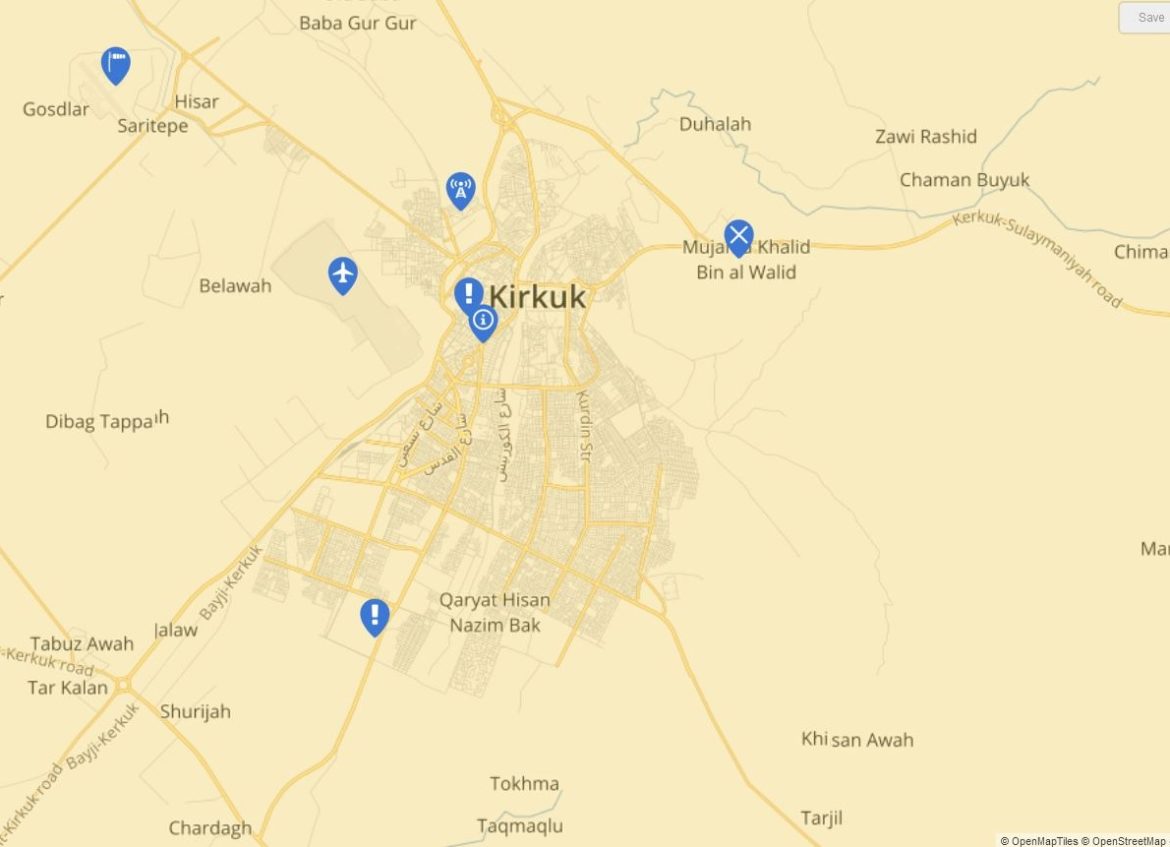1.5K
A weekly brief of events and news occurred in the disputed territories.
Kirkuk
- On Wednesday, May 26, for the fifth time in 2021, hundreds of college graduates protested in front of North Oil Company (NOC), demanding employment. The protesters, consisting of predominantly engineering graduates, called upon NOC to implement the Oil Ministry’s decision to hire graduates on a contract basis. After approximately an hour of protesting, tensions resulted in clashes between protestors and Kirkuk’s Riot Control police which resulted in the injury of at least five people.
- During an environmental conference held at the Kirkuk technical institute, speakers criticized the city’s municipality for massive waste accumulation on the streets of the province. The conference addressed Kirkuk’s environmental issues and the severe decrease of green space reaching less than 1%. So far, in 2021, Kirkuk’s administration has demolished three parks and two soccer fields built by locals and given them to investors to build malls and shopping centers which raised anger among locals.
- On Tuesday, May 25, many locals held a demonstration in front of the Kirkuk governorate building against the administration due filthy living conditions and lack of essential services, including electricity and water. Since the beginning of May, the administration and its municipality have faced several protests in Rahimawa, Shorija, Taseen, Wahid Huzairan, and Domiz neighborhoods.
- On Sunday, May 23, the previously agreed upon joint operation command between the Iraqi forces and Peshmerga was activated. The command is located inside the Kirkuk base, K1. The joint operation center of Kirkuk consists of ten security officers, five of each side which includes Peshmerga members of the joint divisions of the Kurdistan Democratic Party (KDP) and Patriotic Union of Kurdistan (PUK).
- Turkey’s-backed Turkmen Front released a statement rejecting the “return” of the Peshmerga forces to Kirkuk. The Turkmen Front said ISIS (Da’esh) increased activities in the region should not return the Peshmerga forces. The Turkmen Front’s overreaction to establishing the joint operations command is believed to be due to Turkey’s pressure on the party. Simultaneously, Salman Al-Gharbawi, a Sadrist lawmaker, announced: “no issue” in the return of the Peshmerga forces to Kirkuk as long as they are under the “command” of the Iraqi forces. Al-Gharbawi said the Peshmerga forces are part of Iraq’s defense system, and they should not be looked at from a sectarian angle.
- Iraq’s interior ministry designated the fourth brigade of emergency police to take over the security of Kirkuk’s airport. The civilian airport is set to open soon though security issues in the province might delay its operations.
- The Kurdish-owned oil company Kar is ready to return to operations at Havana and Bai Hassan oil fields in Kirkuk. According to unconfirmed reports, talks between the Kurdistan Regional Government (KRG) and the Federal Government for Kar company to resume oil production which has been halted since the events of October 16, 2017 when Shia militias and the Iraqi army attacked Kurdish forces expelling them from the Kirkuk and other disputed territories. Kar company, jointly with Rosneft, is only transporting part of Kirkuk’s oil via Kurdistan’s pipeline to Turkey. The return of Kar company will allow Peshmerga forces to deploy in the area and protect its operations due to constant Da’esh attacks on oil fields. Recently, Iranian-backed militias also attacked several times from Erbil from the disputed territories.
- According to political observers, the recent leadership change among the Turkish backed Turkmen Front has caused further division among the party between the Shia and Sunnis. The Sunni Turkmen who control the party’s leadership and are backed by Turkey’s ruling-Islamist Party of Justice and Development (AKP) fear more Shia control over the party, especially if they win more seats in the upcoming Iraqi elections on October 10, 2021. In the 2018 elections, two Shia Turkmen won parliamentary seats while one seat went to a Sunni Turkmen.
- Following a Da’esh attack near Wadi al Shai, a police captain was killed on Thursday.
Khanaqin
- Unannounced negotiations have been launched between Diyala’s operation command led by the Iraqi army and security officials in the Kurdistan region to reactivate Kurdish public security (Asayish). The Asayish role has been limited to sitting in their headquarters building without the authority to contribute to actual security operations.
- Due to Iran’s water cut off on the Sirwan river, the city of Khanaqin and its suburbs face severe drought. Two main water sources for Khanaqin come from the Sirwan river and the Alwand river, which both have decreased significantly in recent years due to Iran’s constant interdiction of water supplies and building of dams.
Makhmour
- The joint operation command was activated on Monday, May 24th in Makhmour. The town has been one of the hottest spots for Da’esh activities who have been taking advantage of the security vacuum, especially near Qarachogh mountains.
Shingal
- Shingal Mayor Mehma Khalil expressed that holding a fair election in the district is “very hard” due to the region’s security issues. Khalil noted that the only “solution” is to implement the security agreement between Baghdad and Erbil over the Yazidi town of Shingal.
- Nearly 400 refugees who are Da’esh relatives returned to Iraq from Syria’s al Hol camp. The Iraqi government facilitated their return and has settled them in al-Jad’aa camp south of Nineveh province. Several Yazidi Kurdish activists voiced their rejection and appealed to Iraq’s Prime Minister Mustafa al Kadhimi to halt the return of Da’esh families. The Yazidi communities lost tens of thousands of people after Da’esh committed genocide against them in August 2014.

